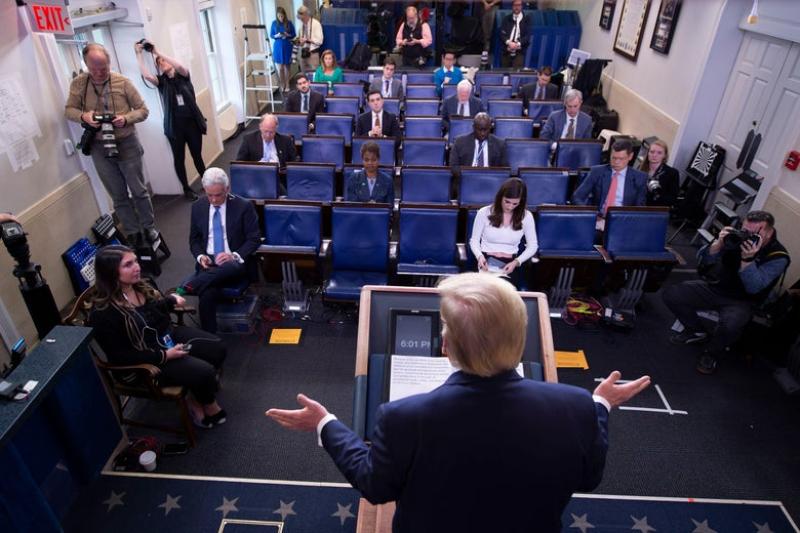Trump may succeed in censoring the Priorities USA ad despite the First Amendment.


Slate homepage * Gone a Bit Bananas Jurisprudence
Trump Is Now Openly Trying to Censor His Critics. He May Succeed.
His campaign’s cease-and-desist letter to broadcast stations is a frightening assault on free speech.
By Mark Joseph Stern
March 26, 20206:50 PM Donald Trump speaks during a coronavirus press briefing at the White House. Jim Watson/Getty Images
Over the course of his presidency, Donald Trump has made thousands of false, offensive, and damaging claims that could hurt his reelection odds. Democrats plan to use these statements as campaign fodder through the November election. On Wednesday, the Trump campaign adopted a new tactic to neutralize these attacks: It threatened to sue critics of the president in a brazen effort to censor Trump’s opponents into silence. Any real legal action is unlikely to hold up against the First Amendment. But Trump doesn’t need to succeed in court in order to win.
Advertisement
This threat came in the form of a cease-and-desist letter sent to television broadcast stations across the country. The letter orders these networks to stop airing an ad created by Priorities USA, a Democratic super PAC. That ad, “Exponential Threat,” juxtaposes Trump’s many dismissive comments about the pandemic with a chart tracking the rising number of infections in the United States.* It ends with one line of text: “America needs a leader we can trust.”
As political ads go, this one is fairly run-of-the-mill. The ad begins with Trump saying “the coronavirus,” then cuts to him saying, “This is their new hoax.” According to the Trump campaign, that edit renders the ad “patently false, misleading, and deceptive.” Its letter provides the full context of Trump’s “hoax” remarks, made during a rally. Here’s the key section:
Coronavirus. They’re politicizing it. We did one of the great jobs, you say, “How’s President Trump doing?”, “Oh, nothing, nothing.” … One of my people came up to me and said, “Mr. President, they tried to beat you on Russia, Russia, Russia.” That didn’t work out too well. They couldn’t do it. They tried the impeachment hoax. That was on a perfect conversation. They tried anything, they tried it over and over, they’ve been doing it since he got in. It’s all turning, they lost. It’s all turning, think of it, think of it. And this is their new hoax. But you know we did something that’s been pretty amazing. We have 15 people in this massive country and because of the fact that we went early, we went early, we could have had a lot more than that.
Advertisement
When Joe Biden released an ad implying that Trump called the coronavirus “a hoax,” the letter points out, fact-checkers accused him of deceiving the public. These fact-checkers accepted Trump’s later assertion that the “hoax” in question wasn’t the coronavirus but rather Democrats’ efforts to “pin this on somebody.” In context, the true meaning seems more ambiguous; like so many of Trump’s wildest declarations, it’s slippery enough that the president can claim innocence while his supporters can interpret it however they choose.
But it doesn’t really matter what Trump meant, because the Priorities USA ad is obviously core political speech, fully protected by the First Amendment. Trump’s campaign suggests that it may seek to punish networks that air the ad in two ways: suing for defamation and urging the Federal Communications Commission to revoke their license. Although both approaches are deeply troubling assaults on free expression, and may chill constitutionally protected expression, neither is likely to succeed.
Start with the FCC route. The agency licenses local stations to broadcast on public airwaves and can theoretically terminate these licenses—though in practice, it almost never does. FCC rules require stations to run ads made by “legally qualified” candidates for federal office, but not ads by super PACs, which are supposed to be independent. Stations are supposed to act with reasonable care to prevent false or misleading ads. But in reality, it relies on the Federal Trade Commission to penalize untruthful advertisers. And even then, the FTC typically goes after commercial advertisers, not political ones.
In the past, Trump has floated the idea of challenging the licenses of broadcast stations that air “fake news.” But the idea was, and remains, a nonstarter, because today’s FCC simply does not revoke licenses on the basis of a station’s political speech. Allowing federal bureaucrats to censor political expression—even when it is arguably “misleading”—raises grave constitutional concerns with which the agency would rather not grapple. The Trump campaign may file complaints against stations that air the Priorities USA ad, but these grievances will cause the stations a minor headache at most, and do not seriously jeopardize their licenses.
Advertisement
The possibility of a lawsuit is a more substantial menace. Trump’s campaign accuses stations of broadcasting “false information” and reserves its right “to pursue all legal remedies available.” That translates to a defamation suit. Stations will have to devote significant time, resources, and money to fight off any legal action, but they will probably prevail. The First Amendment was designed to safeguard political speech. It requires public officials to prove that their critics knowingly lied, or acted with reckless disregard for the truth, to win defamation suits. The Supreme Court has even granted constitutional protections to outright lies, holding that an “interest in truthful discourse alone” is not “sufficient to sustain a ban on speech.” Following SCOTUS’s lead, lower courts have invalidated state laws that penalize knowingly false statements made by political campaigns.
Put simply, politicians and their allies have a First Amendment right to stretch the truth when smearing their opponents, and this right also shields outlets that carry their smears. If the Trump campaign does sue broadcast stations for airing Priorities USA’s ad, it will, in all likelihood, lose. It would lose even if the ad peddled an outright falsehood rather than a tendentious recitation of the facts. But its suit would still compel stations to spend sums of money defending themselves in court.
And therein lies the true danger here: not that stations will actually lose in court, but that they grow so afraid of legal action that they self-censor. Trump is already trying to scare reporters out of covering him accurately; he has threatened to sue several news organizations, including CNN, and his campaign filed a frivolous libel suit against the New York Times. Media outlets are already on alert that Trump might draw them into expensive legal battles. In light of Wednesday’s letter, TV stations are also now aware of that risk. They may refuse to run ads that contain factually debatable criticisms of the president for fear of a costly lawsuit. Meanwhile, they will all continue to give airtime to the president’s incessant lies, because they are newsworthy. Trump can use the power of the pulpit to tilt the playing field in his favor. He could successfully monopolize the marketplace of ideas in the midst of his reelection campaign.
The Trump campaign’s cease-and-desist letter closes on a note of unintentional comedy, declaring that “we will not stand idly by and allow you to broadcast false, deceptive, and misleading information concerning President’s Trump’s healthcare positions without consequence.” In fact, no one lies about Trump’s “healthcare positions” more than Trump himself: The president routinely pretends to support protections for preexisting conditions that his administration is currently fighting to overturn. If TV stations could not broadcast false claims, they would never air a single Trump speech. For better or worse, Trump has a right to manipulate the truth to his political advantage. What he cannot do is gag his opponents when they try to punch back in kind.
Advertisement
For more on the impact of the coronavirus, listen to this week’s What Next: TBD.
View Transcript
Correction, March 27, 2020: This piece originally misidentified the name of the Priorities USA ad as “Existential Threat.”
Donald Trump Elections First Amendment Free Speech Media Reprints Advertise: Site / Podcasts Commenting Contact / Feedback Pitch guidelines Corrections About us Work with us Send us tips User agreement Privacy policy AdChoices Follow Us Facebook Twitter Instagram The Slate Group logo
Slate is published by The Slate Group, a Graham Holdings Company.
All contents © 2020 The Slate Group LLC. All rights reserved.
